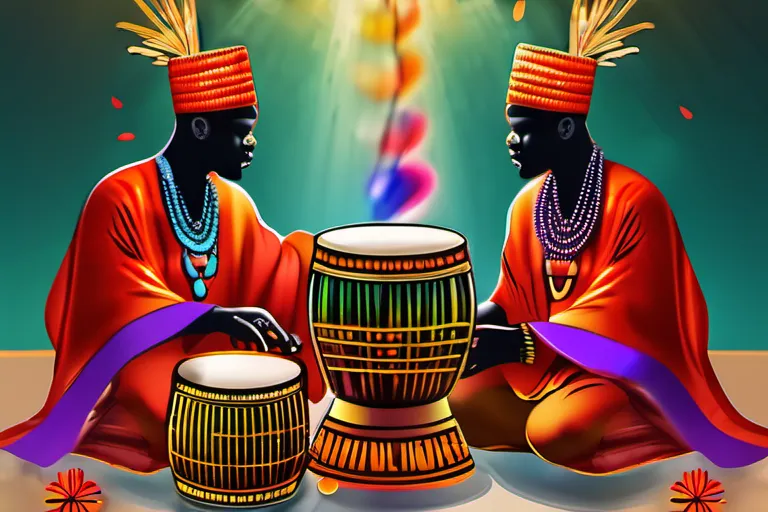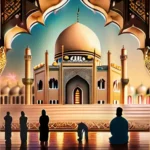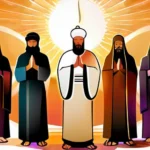Explore the rich traditions, beliefs, and practices of the ancient Yoruba religion.
The Yoruba religion is a complex and fascinating spiritual system that has been practiced for centuries in West Africa. This article will delve into the history, beliefs, deities, rituals, and cultural significance of this ancient faith.
The History of the Yoruba Religion
The Yoruba religion, a complex web of ancient beliefs and practices, has woven its way through the fabric of West Africa for centuries. It’s like a vast river, flowing through different regions and communities, adapting to local customs yet retaining its core essence. How did this rich tapestry come into existence? Where does its history begin?
The origins of Yoruba religion are deeply rooted in oral traditions passed down through generations. One legend tells us that the first humans came from Ife, a city known for its ancient kingdom and vibrant arts. It’s as if this city was the cradle from which Yoruba religion sprang forth, bringing with it stories of creation, deities, and moral teachings. But how did these beliefs spread across the lands?
Over time, the Yoruba people migrated, carrying their religious practices with them. They moved to new territories, intermingled with other cultures, and shared their traditions. It’s like a seed being carried by the wind, eventually planting itself in fertile soil where it grows into something entirely new yet connected to its roots. The religion evolved, absorbing influences from neighboring communities while maintaining its distinct identity.
The spread of Yoruba religion also had a significant impact on other regions. In places like Benin and Togo, the influence of Yoruba religious practices can be seen in local customs and traditions. How did this happen? Was it through trade routes or through intermarriage between different groups? The answers are as varied and intricate as the river itself.
Today, the history of the Yoruba religion is a story that continues to unfold. From its ancient beginnings to modern practices, it’s a journey filled with transformation and resilience. As we explore this rich heritage, we find not just religious beliefs but also a tapestry of cultural expressions, community values, and spiritual insights that have shaped an entire civilization.
Yoruba Deities: The Orisa
Understanding Yoruba religion can be like unlocking a treasure chest filled with ancient wisdom and mystical knowledge. How do these deities, known as Orisa, shape the daily lives and beliefs of the Yoruba people? The Orisa are more than just gods; they are manifestations of nature, forces of life, and guardians of the universe. Each deity has its own unique attributes, roles, and stories that reflect the complexity and richness of the Yoruba spiritual world.
Take Eshu, for example, often depicted as a mischievous trickster with many faces. Eshu is like the gatekeeper between the earthly realm and the divine. He ensures that prayers and offerings reach their intended deities. His role in guiding souls to the next world makes him both feared and revered. Could it be that he guides your path too, even when you don’t notice?
Then there’s Ogun, the deity of iron and war, symbolizing strength, courage, and creativity. Just as a blacksmith forges metal into tools, Ogun shapes individuals through challenges and struggles. His role is to help humans master their environment and themselves. Do you sometimes feel like you’re forging something in your life with every obstacle?
Oxu, the goddess of love and fertility, represents nurturing and growth. She oversees the cycles of nature, ensuring that life continues to flourish. Think about her role as a garden that needs constant care to bloom; just like she ensures crops grow, do you find yourself needing support in your personal relationships?
Each Orisa has a pantheon of spirits or egungun associated with them. These spirits serve as intermediaries and carry out the will of the deities. Through rituals and sacrifices, Yoruba practitioners seek to maintain balance and harmony within their lives by appeasing these powerful beings.
The Orisa play a crucial role in the daily life of every Yoruba person. They are invoked during important life events like births, marriages, and funerals, as well as for daily blessings and protection. The intricate web of beliefs surrounding the Orisa reflects the deep connection between the natural world and spiritual existence in Yoruba culture.
The Role of Rituals in Yoruba Religion
Rituals are like the heartbeat of Yoruba religion, pulsating through the daily lives of its practitioners. Imagine a world where every action is imbued with spiritual significance; that’s what makes Yoruba rituals so profound and meaningful. How do these practices shape the way people interact with the divine? Rituals in Yoruba tradition are not just symbolic acts but are deeply intertwined with the fabric of community life, offering a sense of continuity between the physical world and the realm of spirits.
Each ritual serves a specific purpose, whether it’s to honor an Orisa, seek protection from misfortune, or celebrate a significant event in one’s life. Think about it like a bridge connecting two realms – the earthly and the spiritual. Through these rituals, practitioners believe they can communicate with the divine beings, seeking guidance, blessings, and resolutions to their problems.
The importance of rituals is evident in how they are integrated into every aspect of Yoruba society. From the dawn till dusk, people engage in various ceremonies that honor Orisa, each one holding a unique significance. The daily ofuro (ritual bath) is not just about cleanliness but a ritual of purification and spiritual renewal. It’s like taking a step back into tradition, ensuring oneself spiritually prepared for the day ahead.
Rituals also play a crucial role in healing and maintaining social harmony. A gbogoro, a traditional drumming session, is more than just music; it’s a communal ritual that fosters unity and strengthens bonds within the community. In times of crisis or celebration, these rituals come to life, embodying the resilience and cultural richness of Yoruba religion.
Ultimately, understanding the role of rituals in Yoruba religion means recognizing their deep-seated impact on both individual and communal lives. These practices are not just ancient traditions but vibrant expressions of faith that continue to thrive, shaping a spiritual landscape rich with meaning and purpose.
Yoruba Beliefs: The Intersection of Spirituality and Life
Understanding Yoruba religion means delving into its rich tapestry, where ancient traditions intertwine seamlessly with daily life. How do sakoto, the Yoruba deities, influence the lives of practitioners? Are they merely myths or are they deeply rooted in the fabric of their existence?
The worldview of the Yoruba people is built upon a belief system that sees every aspect of nature as imbued with spiritual energy. Is it not fascinating how the ojunkẹmi, or oracles, serve as intermediaries between humans and these deities? How do they guide decisions and offer insights into one’s future? These oracles are more than just divination tools; they are living metaphors for the complex interplay of human and divine realms.
The concept of ifa, a system of divination, plays a crucial role in understanding Yoruba religion. It is not simply about predicting the future but also about providing moral guidance and wisdom. How do practitioners see their destiny through the lens of ifa? Do they view it as a mere fortune-telling mechanism or as an integral part of their spiritual journey?
The rituals surrounding ijeji, the Yoruba divinities, are deeply symbolic. Each ritual, whether it be during the harvest festival or during personal crises, serves a specific purpose in connecting the individual to the divine. How do these rituals help individuals navigate life’s challenges and maintain balance? Are they just cultural practices or do they hold deeper spiritual significance?
Exploring Yoruba beliefs reveals how their values are intertwined with every aspect of life. From birth ceremonies that celebrate new beginnings to funeral rites that ensure a safe passage, the religious framework is woven into the very fabric of society. How do these rituals reflect the Yoruba belief in the cyclical nature of life and death? Are they merely traditions or are they essential practices for spiritual growth?
By examining these beliefs and practices, we gain insight not only into the spiritual lives of the Yoruba people but also into their broader cultural values. The intersection of spirituality and daily life is a fascinating exploration that sheds light on the rich tapestry of human experience.
The Cultural Significance of Yoruba Religion
Imagine the Yoruba religion as a vibrant tapestry, woven intricately through generations of African culture. How does this intricate design impact society beyond spiritual beliefs? The influence of Yoruba religion on African art, music, and even social structures is profound and multifaceted.
Art in the Yoruba tradition often serves as a visual manifestation of their rich religious heritage. From elaborate sculptures depicting deities to intricate beadwork symbolizing spiritual significance, each piece tells a story. How many times have you marveled at an African mask or sculpture without considering its deep-rooted religious and cultural importance?
Music in Yoruba society is another powerful medium through which this religion expresses itself. From the rhythmic beats of the akpose (a type of drum) to the soulful tones of ogun buruku, musical forms are not just entertainment but a means of invoking spiritual presence and conveying messages. Can you imagine a Yoruba festival without the vibrant sounds that fill the air, carrying both past and present beliefs?
Socially, the religion has shaped communal practices and values. Traditional ceremonies often involve community participation, reinforcing bonds and strengthening social ties. How does this collective practice impact the way community members interact with each other? Is it not true that many Yoruba festivals bring people together in a celebration of their shared heritage?
The influence extends further into governance and ethics. The principles of justice, respect for elders, and harmony among community members are deeply embedded within the religious framework. How do these values guide daily life in Yoruba societies? And how might they offer insight or solutions to modern societal challenges?
Understanding Yoruba religion is not just about studying beliefs; it’s about recognizing its profound impact on African culture and beyond. Every aspect of this ancient tradition, from the art that adorns homes to the music that fills streets, reflects a deep connection to the spiritual world. How can we appreciate these aspects more deeply in our own lives?
Modern Practices and Contemporary Relevance
How does a religion that has roots deep into ancient times continue to resonate in the 21st century? The Yoruba religion, with its complex and rich traditions, is not just a relic of the past but a vibrant practice that thrives even today. Imagine if your spiritual beliefs could adapt to modern challenges while preserving age-old wisdom—wouldn’t that be fascinating?
In today’s world, where globalization and technological advancements can sometimes overshadow traditional values, Yoruba religion stands as a living example of how ancient practices can remain relevant. The Orishas, or deities, continue to play central roles in the lives of many Yorubas, guiding them through life’s challenges and celebrations. Through rituals like the Igbo Nla (the traditional cleansing ceremony) and Oggun Festival (honor for the god of iron), believers find a sense of community and continuity.
The modern relevance of Yoruba religion extends beyond personal belief systems. It influences social structures, with many communities organizing around religious principles. The concept of Awujalọ, which means ‘the one who stands by your side,’ encapsulates the supportive network provided by the community in times of need. This support system is vital not just for spiritual guidance but also for fostering a sense of belonging and resilience.
Moreover, Yoruba religion’s emphasis on anitọ (good conduct) and Eshu (the messenger deity who ensures messages are delivered correctly), highlights the importance of ethical living. In an era where moral values can sometimes be blurred by rapid change, these teachings offer a beacon for guiding behavior.
As we look at how Yoruba religion continues to thrive in modern times, it becomes clear that its adaptability and deep-rooted traditions make it a dynamic force. Whether through traditional practices or contemporary interpretations, the Yoruba religion remains not just a spiritual guide but a profound influence on daily life and community relations.
Conclusion
 By the end of this article, you’ll have a deeper understanding of the Yoruba religion and its profound impact on African culture and spirituality.
By the end of this article, you’ll have a deeper understanding of the Yoruba religion and its profound impact on African culture and spirituality.











